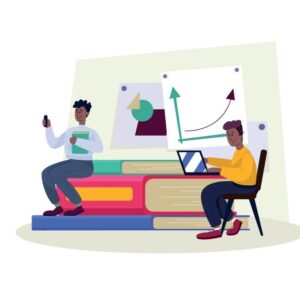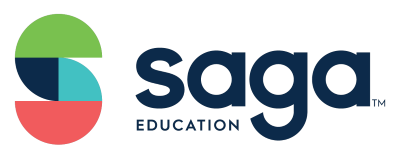For Siraye, it’s About Getting the Support She Needs
January 31, 2022When 9th grader Siraye Maximin first walked into a Saga math tutorial, a class during the school day, she didn’t know what to expect. “I was nervous and excited.” She admitted that while she got good grades in math in grade school, somehow, she got lost along the way. “Algebra was getting hard for me during the pandemic. I struggled with math, and I wasn’t getting the support I needed.”
Like many of her fellow students, she was having trouble getting motivated taking remote classes at home. “When the pandemic first hit, I would never show my face, I didn’t turn on my camera. I don’t know if it was because I didn’t have the courage or the respect to wake up in the morning. I just didn’t really care.”
Now that Maximin is back in-person at New York City’s High School of Fashion Industries, things are getting a little bit better. “I get up every morning, get dressed and I do my hair.”

A Remote Adjustment
She comes to class, turns on her computer and meets with her tutor, Ben Freedman. Freedman and Maximin were both featured in a New York Times article about remote learning.
Freedman, a remote Saga Fellow in Portland, Maine, acknowledged that it took a bit of time for everyone to get used to a remote learning environment, “In the beginning, I was afraid that everyone would be distracted. But now, we have a routine. I’m comfortable with them, and they’re comfortable with me,” he said.
Relationship Building
It all starts with building relationships with every student. “I like when he tells me about himself, and I tell him about myself. Teachers don’t really express that, because it’s not their job,” said Maximin. This is difficult for teachers who support 100 or more students each day.
Freedman said he enjoys the relationships he has with his students. “All of these students are bright, but they’re not all the given opportunities that they need. I try to tell them that college is within reach for all of them, if it is one of their goals,” he said.
Freedman also gets training and support from his site director, Myesha Hossain.
“Myesha provides support and sits in on parts of tutorials. We share reflections and feedback,” he added.
The Saga math tutorial is set up so that Maximin, along with two of her other classmates, work with Freedman to support them on the Algebra lessons that they are learning in their regular teacher-led class. “It’s kind of stuck in my head because I do math twice in one day. If I don’t get it, he helps me work through the problems and if I do, we go onto harder challenge questions.”
And it works. The New York Times article reported that “Saga Education has demonstrated strong results in providing math help to teenagers from low-income families through in-person, small-group tutoring that takes place during the school day.”
Evidence-Based Research
This evidence is also cited in research from the University of Chicago Urban Lab. “By providing personalized tutoring to students at a low-cost…Saga’s intervention can reduce the variability of academic achievement in classroom settings at scale, an issue teachers report is one of the most challenging aspects of their jobs.”
High-impact tutoring is also a federal focus and priority. In fact, U.S. Education Secretary Miguel Cardona gave a clear message to school districts in a late January 2022 speech. “I’d like to challenge all of our district leaders to set a goal of giving every child that fell behind during the pandemic at least 30 minutes per day, three days a week, with a well-trained tutor who is providing that child with consistent, intensive support. We cannot expect classroom teachers to do it all themselves. Districts have American Rescue Plan funds available to them today to invest in these efforts.”
As for Maximin, it’ll be a few years before she graduates. She’s studying business foundations and is thinking about owning her own business, being a hairstylist or maybe being a nurse. Either way, she sees the practical applications of math in her life—now and in the future. “Before, I didn’t think math was a big thing, but if you don’t have math, you don’t know how to do anything. You don’t know how to build your own future house. Now I understand what I have to do and why. When we know math, it helps you develop things.”
Freedman said his experience as a Saga Fellow has taught him how to be a leader, and his students have inspired him as well. “It makes me want to bring my best self to the classroom.”
